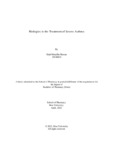Biologics in the treatment of Severe Asthma

View/Open
Date
2022-04Publisher
Brac UniversityAuthor
Hassan, Shah MusallinMetadata
Show full item recordAbstract
At present, asthma is one of the major chronic respiratory diseases that distorts the daily life of
nearly 300 million people around the globe and almost 5–10% of these people experience
severe or uncontrolled asthma. Asthma is a condition in which the airways undergo chronic
inflammation resulting in wheezing and difficulty in breathing. It is predominantly triggered
due to an irritant or an allergen, virus exposure, exercise and emotional stress. Contemporary
treatment of asthma includes inhaled corticosteroid (ICS) with montelukast or theophylline as
additional controllers and oral corticosteroids and inhaled long-acting beta 2 agonists (LABA)
are administered in case of insufficient control of symptoms. The advent of biologics became
pivotal since the conventional treatment alternatives were ineffective in the control of severe
asthma. Omalizumab, mepolizumab, reslizumab, benralizumab, dupilumab and tezepelumab
are the biologics that have been implemented successfully in treating severe asthma patients.
This enabled patient specific, safe and effective treatment for asthmatics.
